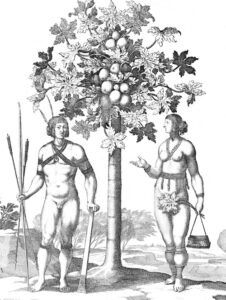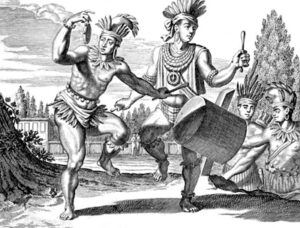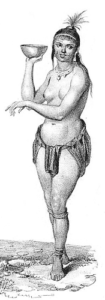n
n

n
From the usual place:
n
A grimoire is a textbook of magic. Books of this genre, typically giving instructions for invoking angels or demons, performing divination and gaining magical powers, have circulated throughout Europe since the Middle Ages.
n
Magicians were frequently prosecuted by the Christian church, so their journals were kept hidden to prevent them from being burned. Such book contain astrological correspondences, lists of angels and demons, directions on casting charms and spells, on mixing medicines, summoning unearthly entities, and making talismans. “Magical” books in almost any context, especially books of magical spells, are also called grimoires.
n
The word grimoire is from the Old French grammaire, and is from the Greek root “grammatikos”, “relating to letters”, from which grammar, a system for language, and glamour, influential appeal, are derived. In the mid-late Middle Ages, Latin “grammars” (books on Latin syntax and diction) were foundational to school and university education, as controlled by the Church—while to the illiterate majority, non-ecclesiastical books were suspect as magic, or believed to be endowed with supernatural influence. The word “grimoire” came over time to apply specifically to those books which did indeed deal with magic and the supernatural.
n
Similar magical writings have existed from antiquity, and although these are not in the same genre of medieval magic, they are sometimes described as grimoires.
n
*
n
The idea of a grimoire — a book endowed with magical powers — is one of the more constant elements of literature; and perhaps the single most hackneyed metaphor for the life in books. It seems that not a year goes by without the publication of some novel whose central idea is that of a mysterious book which changes our lives.
n
Indeed, one could perhaps consider the grimoire a kind of literary genre in itself. Its different embodiments should perhaps be judged on how interesting and original the special powers ascribed to the Special Book are rather than the actual adventures in occasions.
n
The most ordinary, and boring, grimoire is a book which leads (like the back wall of a wardrobe) to another world, into which one falls thereupon to experience the adventure of his life. This kind of grimoire is boring, because it is not in any sense original: falling into another world is precisely what happens to us when we read a book. And some of us, like yours truly, fall into another world some 200 times a year. One wonders how little the inventors of this kind of grimoire must read: it is not the falling that is wonderful; it is what we fall into, which is.
n
But some grimoires are better than others. Here are two you may want to add to your library.
n
*
n
In Edmund Niziurski’s Siodme Wtajemniczenie (which follows the hero as he advances through subsequent levels of arcane knowledge of a secret society, which would have been a serious business if the society were not one of – teenage boys) describes a grimoire entitled Niezwykłe przygody Anatola Stukniętego na początku – The unusual adventures of Anatole Bonkers at first.
n
The special nature of the book lies in it being strongly written. This refers to the book’s ability to visit upon the bodies of its readers the effects of whatever they are reading about. And thus, some readers, while reading in it (on about page 7) about Anatole – its hero — being captured and tortured with white-hot irons suffer second degree burns just from reading about it; others, when reading the section in which Anatole escapes his tormentors and flees, barefoot, across ice and snow (on about page 9) suffer frost bite to their toes.
n
The most important thing to know about this Grimoire is that it has never been read from cover to cover, because on about page 13 Anatole falls into sleep; and thereupon follow 320 pages of it. Not his dream, mind you, but dreamless, lifeless sleep. (Those who complain about Proust’s 30 pages of “trying to fall asleep” should take note). Naturally, everyone trying to read through Anatole falls asleep during this section and no ruse to beat this effect has yet been devised.
n
(What makes Anatole even more interesting is the way Niziurski’s heroes put it to tactical use: neutralizing their enemies by giving them The Unusual Advetures to read).
n
I have often had occasion to reflect on the special powers of this grimoire. Partly because we all know books with incredible soporific powers; and enjoy them. (Personally, I find Gibbons’ Decline and Fall a superb — and over the counter! — substitute for Xanax; and, like Anatole’s sleep, completely intraversible). But also partly because there really do seem to be strongly written books. For me, Mann’s Magic Mountain is just such a book.
n
This has often been praised for its deep philosophical content and political discussion; but I have never found these all that interesting; but, on the contrary, have always found the book irresistibly spell-binding for another reason: on account of the way I am mesmerized by its various descriptions of the most ordinary things: the descriptions of the meals at the Berghof, of the flavor of Maria Mancini cigars, the sound of tuberculotic caugh. Mann’s writing has for me the strange, Anatolian power to fascinate me with the fact that the hero is walking in the street, or blowing his nose. In the former case, my feet seem to tremble, in the latter, my nose twitches. I put down the book with the sort of disorientation with which I might wake from an unusually lucid dream.
n
*
n
In Aleksander Kosciow’s Swiat Nura (Loon’s World) a different grimoire appears, a book with the strange title Pielegnacja i tozsamosc drzew – The care and personal identity of trees; though this title is more of a nickname, since the title itself, like the body of the text, continues to mutate. (This too, is a rather common fantasy – pictures that begin to move, text which arranges itself before our eyes into new shapes, different each time we look). But hear the man explain it:
n
(Having discovered that the title had changed) I put the book away and lived my life. But every now and then something tempted me and I took it up again. As if I had wanted to catch it – in the act. And you know? One day something did change. From the outside everything looked the same, but inside something was not right… I leaf through, looking for those white pages in the middle which I had discovered there once – but – they were gone! It’s not that the white pages disappeared and the text about care of trees became unified again. No! They were now covered with text! The drivel about care of trees ended on page, say, 100, and then there were a few pages, formerly white, now printed over, and the care of trees continued again from page 115. I thought for a moment that I was going nuts (which, in my neighborhood is not so rare after all). But I decided to lay and ambush: oh, no, this book will not make a fool of me! After about a week I looked and noticed that the pages with new text, the grown-in pages, have somehow increased in number, spilling over and pushing aside the neighboring pages of the original. There was a foreign text and it continued to grow. It was not just strange but also, somehow… evil. There were other changes: instead of the original names on the title page, some initials would appear; the number of pages of the new text increased; the book was somehow strangely hot. I admit I began to dislike the idea of keeping this book under my roof. It was no longer a bibliophile curio, but a metaphysical one. In the end, I put it at the bottom of a sack of old books, and I took it to the flee market in Le Mechiguenet, and I dumped it stealthily under a stall.
n
But what was the foreign text about? Something having to do with the construction of some kind of a drum. Later, we learn in the book, a man who has stumbled on The Care and Personal-Identity of Trees became obsessed with it and, as a result became isolated from the society, began to spend much time in a certain clearing in the forest and, eventually, turned into a tree himself.
n
Books of course do change us; and they do, temporarily, turn us into vegetables — a man lost in reading seems rooted to his arm-chair. And, as anyone who writes regularly and a lot knows, texts do sometimes arise spontaneously, of themselves, just the way tumors grow. But I am most touched by the idea that the book was strangely hot. Many of my books should be white hot. I am often surprised that a book which I have been reading last 6 hours remains cool to the touch.
n













